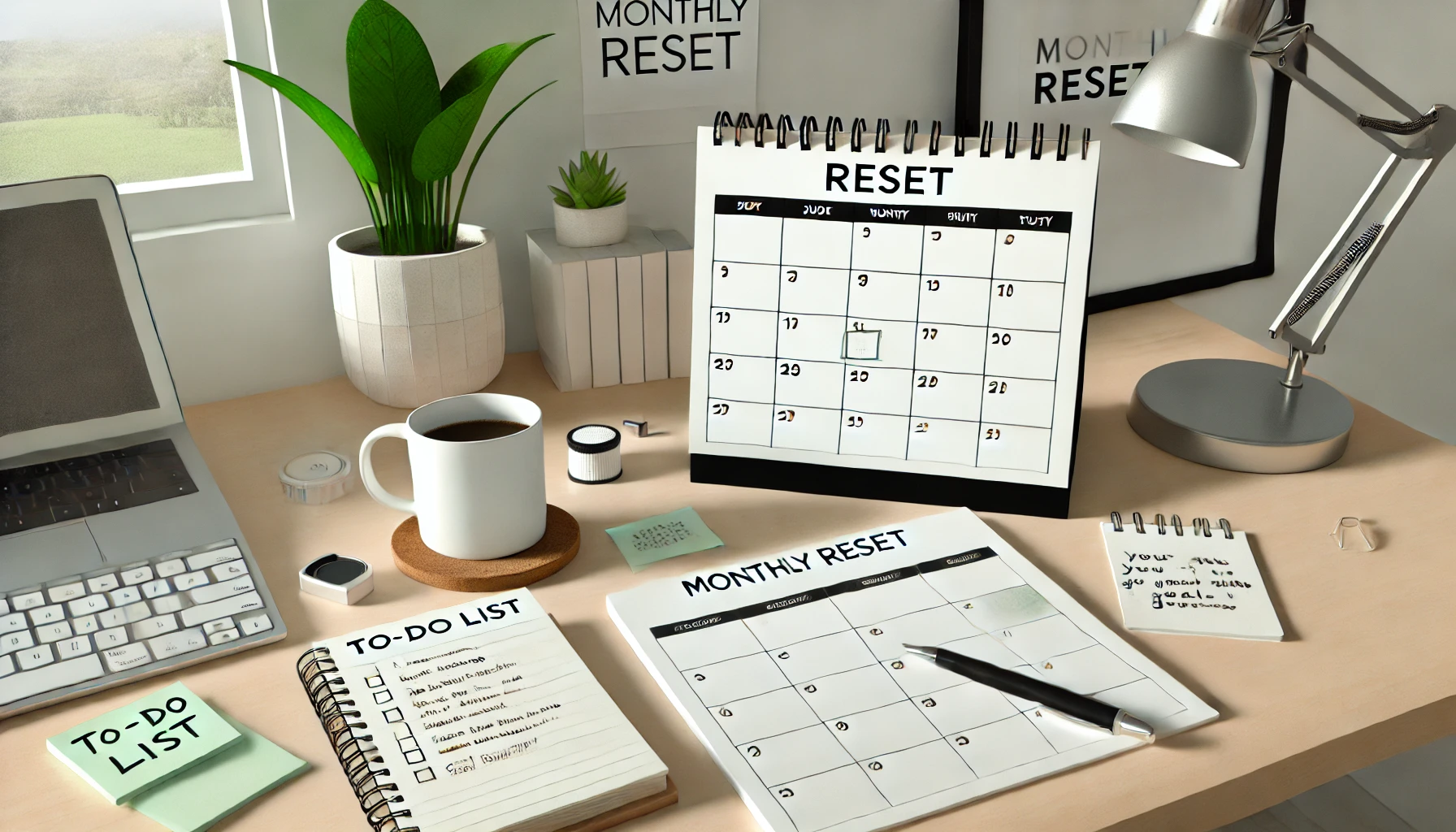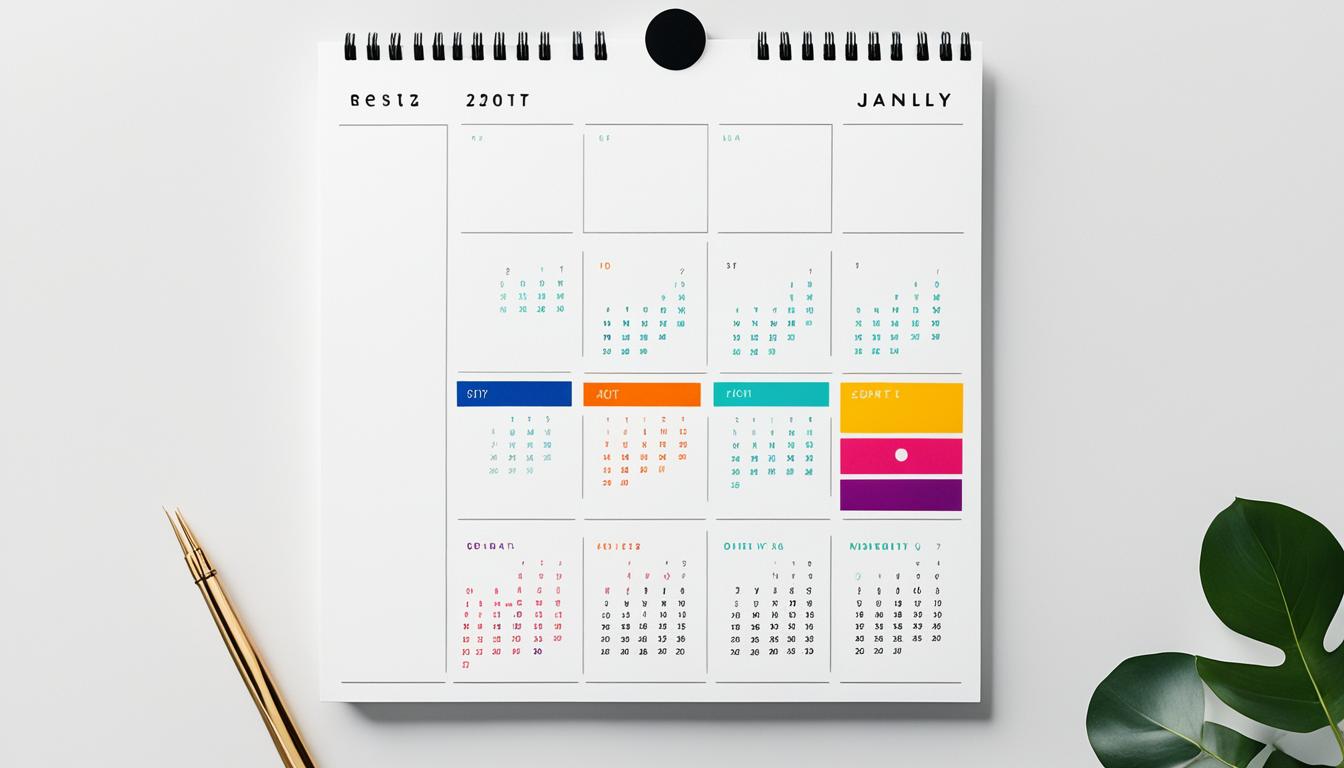Efficiently closing out each month with a structured monthly refresh can significantly enhance your overall productivity boost and well-being. As we step into 2024, establishing a well-thought-out reset routine becomes indispensable for ongoing life optimization. Reflecting on past achievements, setting new goals, and organizing your life aspects contribute to a smooth transition into the upcoming month.

Research shows that incorporating a monthly reset routine aids individuals in keeping their morning and evening routines simple, which in turn boosts their productivity across various industries. Regularly reviewing and reflecting on the past month’s progress helps identify inefficiencies and fosters personal growth, particularly essential in fields requiring continuous improvement and adaptability.
Moreover, such routines emphasize the importance of 2024 self-improvement by encouraging goal setting, thematic planning, and strategic reviews. This holistic approach not only helps in achieving personal and professional goals but also supports overall mental health and stress management, proving highly beneficial in high-pressure sectors.
The Importance of Having a Monthly Reset Routine
A monthly reset routine isn’t just a trendy concept; it’s a proven practice that offers myriad benefits. Whether it’s enhancing productivity tips, goal setting, or ensuring mental wellness, committing to regular monthly planning can set you up for success in various areas.
Increased Productivity
Research has consistently highlighted that engaging in a monthly reset routine can significantly boost productivity. A study found that 90% of individuals experienced increased productivity after decluttering their physical spaces. This routine gives you the clarity needed to focus on tasks without distractions, making it easier to implement productivity tips effectively.
Goal Achievement
Monthly planning is vital for goal achievement. By regularly reflecting on your previous month’s accomplishments and setbacks, you create a roadmap for future success. Indeed, 75% of individuals who maintain a monthly reset routine reported feeling more organized and focused. Regularly setting and reviewing goals ensures that you’re constantly aligning your actions with your larger objectives.
Mental Health Benefits
Mental wellness is a fundamental aspect of any successful routine. A monthly reset allows for a structured self-care check-in, with 60% of individuals adjusting their self-care goals during these reviews. The practice of gratitude, a key component of the monthly reset, has been shown to reduce stress by 40%. These habits contribute significantly to overall mental health, making it easier to manage stress and maintain a positive outlook.
Identify Your Monthly Focus Areas
When planning a monthly reset routine, identifying your focus areas is crucial for effective focus optimization. By establishing clear priorities, you can address various facets of your life in a structured manner. This structured approach enhances personal development and professional growth, helping you achieve a comprehensive reset every month.
Themed Monthly Resets
Opting for thematic resets provides an organized pathway to manage different aspects of your life. Whether focusing on home, health, family, finance, work, or personal goals, themed resets allow you to tailor routines according to your specific needs. This flexibility ensures that each area of your life receives the attention it deserves, facilitating a holistic approach to personal development.

Personal vs. Professional Focus
Undertaking a monthly reset by distinguishing between personal and professional focus can significantly streamline your activities and goal-setting processes. Addressing personal development through activities like self-care, habit tracking, and introspection aids in maintaining balance and well-being. Meanwhile, concentrating on professional growth through career planning, skill enhancement, and workspace organization helps propel your career forward. This bifurcated approach ensures that you can manage both domains efficiently, leading to a well-rounded life reset.
Set a Fixed Date for Your Monthly Reset Routine
Scheduling a devoted day for your monthly reset routine is crucial for embedding it into your lifestyle. Consistent planning and selecting a fixed date each month reinforces the importance and regularity of this exercise. It fosters a ritualistic approach, ensuring that the process becomes a non-negotiable part of your schedule.
By engaging in routine scheduling, you can maintain focus and effectively manage your time. Setting 3-5 monthly priorities helps increase productivity by narrowing down on critical areas. This approach, as recommended by experts, leads to intentionality and better goal achievement.
Utilizing tools like a Goal Tracker can aid in recording daily progress towards these goals. For instance, incorporating activities such as trying a new fitness class, working out an extra day each week, or daily journaling can significantly boost self-improvement and overall well-being. These practices are designed to keep motivation high and ensure steady progress, as discussed in detail by Jeannette Koczela.

Additionally, an expense tracker can be invaluable for financial management, helping you stay on top of your finances. Including a “meals I want to make” section in your reset routine not only makes cooking more enjoyable but also prevents meal repetition. Cultivating new habits one at a time, such as those suggested in the Ultimate Monthly Reset Routine, ensures sustainable growth without overwhelming yourself.
Integrating a “Monthly Planning” section for organizing important dates, holidays, and upcoming trips into your reset routine solidifies forward planning and structured routine scheduling. This holistic approach, highlighted in various forums on routine scheduling, helps maintain a balanced and organized lifestyle.
To cap off the monthly reset routine, creating a list of things to look forward to can help cultivate enthusiasm and a positive outlook toward future events. This practice underscores the importance of ending the reset with a focus on life’s positive aspects, reinforcing overall well-being and happiness.
Reflection on the Past Month
Reflecting on the past month is a crucial element of any successful monthly reset routine. Engaging in self-reflection and considering the journaling benefits can provide profound insights into your progress and areas that need improvement. This practice helps in evaluating what worked well and understanding the challenges faced during the month.

Journaling Your Thoughts
Journaling is an effective method to capture your thoughts and emotions from the past month. By dedicating time to write down your experiences, you engage in progress evaluation and develop a deeper understanding of your personal growth. Participants in monthly reset routines who use journaling report a 40% increase in self-awareness and personal growth. Utilizing prompts can help guide your reflection, making it easier to uncover recurring themes and patterns in your behavior.
Assessing Progress and Challenges
Regularly assessing your progress and challenges is essential for ongoing self-improvement. Documenting your achievements and setbacks enables a clear evaluation of your efforts and assists in overcoming challenges. Individuals who consistently track their habits and goals see a 15% improvement in overall consistency and progress monitoring. This structured approach aids in identifying areas where you excel and recognizing any obstacles that may need further attention.
Incorporating these reflective practices into your monthly reset routine can lead to feeling more balanced and satisfied with various aspects of life. As you gain clarity on your goals and realign with your priorities, you will notice a considerable reduction in stress and anxiety, along with a substantial boost in confidence and motivation. Engage in these practices to experience the full range of benefits offered by regular monthly resets.
Create a Comprehensive To-Do List
Creating a comprehensive to-do list is essential for effective task management throughout the month. By categorizing tasks into specific areas such as household organization and financial planning, individuals can ensure a balanced and organized approach to their monthly responsibilities.

Household Tasks
Household organization is crucial for maintaining a clean and stress-free environment. Consider incorporating tasks such as cleaning rooms, tidying office spaces, and tracking appointments. Regular household tasks can significantly impact mental health and productivity, leading to a healthier lifestyle and improved sleep. Decluttering spaces and setting up routine checks for household chores will facilitate a more organized daily living experience.
Financial Tasks
Effective financial planning is another critical aspect of a monthly to-do list. Tasks such as setting up budget trackers, evaluating monthly expenses, and updating the family budget can help monitor spending habits and savings goals. Regular financial tasks not only aid in achieving long-term financial objectives but also reduce stress and build self-confidence by creating a clear understanding of one’s financial situation. Dedicated time for financial planning can transform chaotic finances into a clear and structured financial outlook.
Plan Out Your Goals for the Month Ahead
Establishing clear and achievable objectives is a vital part of any effective monthly reset routine. A well-structured goal planning process ensures that you remain focused and productive throughout the month, enhancing your ability to meet both personal and professional targets.

SMART Goals Framework
One of the most effective methods for goal planning is utilizing the SMART objectives framework. SMART stands for Specific, Measurable, Attainable, Relevant, and Time-bound. By setting SMART objectives, you create a clear roadmap that guides your efforts and facilitates progress tracking. This structured approach ensures that your goals are not only well-defined but also achievable within a set timeframe, thereby maximizing the likelihood of success.
Setting Milestones and Tracking Progress
In addition to crafting SMART objectives, it is crucial to break down your goals into smaller, manageable milestones. Milestone setting allows you to monitor your progress more effectively by providing clear checkpoints to measure advancements. Regular progress tracking helps identify areas that need improvement and ensures that you stay on course to achieve your monthly goals. Incorporating these strategies into your monthly reset routine helps maintain momentum and fosters a sense of accomplishment as you reach each milestone.
Organize and Declutter Your Space
The mental clarity that comes from physical tidiness is undeniable. Engaging in monthly clean-ups of wardrobes, electronic devices, and living spaces using effective decluttering strategies can significantly contribute to a stress-free environment. Implementing systematic organizational tips ensures that each area of your home remains orderly and functional.
Incorporating regular activities such as cleaning your wardrobe, purse, fridge, work table, phone gallery, and laptop folders can simplify your life considerably. By dedicating time to these tasks, you will not only optimize your space but also enhance your mental well-being.
For those who manage to declutter both their physical and digital spaces, the benefits are plentiful. Setting a decluttering or organizational goal each month can help maintain focus and direction.

Employing key space optimization techniques, such as allocating specific percentages of your time to different areas of your home, can make a world of difference. For instance, creating habit trackers for new organizational habits can lead to lasting change and a more structured living space.
As part of your monthly reset routine, be sure to foster self-reflection with questions like what went well, what didn’t go well, and how you can improve. Emphasizing gratitude for the previous month’s positive aspects will further enhance the benefits of your organized and decluttered environment. These small but effective steps can pave the way for a more streamlined and harmonious lifestyle.
Consider exploring additional organizational tips to further enrich your monthly reset routine. The more you invest in decluttering strategies and space optimization, the more you will reap the rewards in both your personal and professional life.
Focus on Self-Care and Well-being
A balanced reset routine gives ample space for self-care considerations. Implementing self-care practices focused on physical fitness, emotional resilience, and mental health ensures overall well-being. This holistic approach is key to sustaining health and happiness.
Physical Health Activities
Engaging in physical fitness activities regularly, such as stretching, can stimulate muscle blood flow and decrease tension headaches. Nourishing your body with healthy foods enhances overall well-being. A reset routine that includes these elements helps maintain physical health comprehensively.

Mental and Emotional Health
Incorporating mental and emotional health activities like meditation, social media detox, and therapy can build emotional resilience and improve mental health. Reflecting on your mental well-being during reset routines can reduce stress, anxiety, and depression. Self-care practices encourage personal growth and self-awareness, nurturing better relationships and boosting productivity and life satisfaction.
Review and Adjust Your Budget and Finances
An integral component of a monthly reset ritual is the financial review. This consists of a close examination of spending habits, budget adjustments appropriate to the month, and strategic planning for savings and investments to secure financial well-being. With the average personal savings rate for individuals in the United States at only 3.7% as of December 2023, adopting effective strategies can be crucial.
Tracking Spending Habits
Tracking expenses is crucial to determine spending patterns and identify areas where savings can be made. Categorizing expenses into fixed (e.g., rent, utilities) and variable (e.g., groceries, entertainment) helps in recognizing opportunities for budget adjustments. Following the 50/30/20 budget rule, which dictates that 50% of income should go towards needs, 30% towards wants, and 20% towards savings and investments, can offer substantial guidance in managing finances effectively. Making specific budget adjustments such as canceling unused subscriptions and reducing dining out expenses can contribute to improving financial stability.
Planning Savings and Investments
The 50/30/20 rule emphasizes that individuals should allocate at least 20% of their net income towards saving strategies. Automating savings helps ensure consistency, which is vital for long-term financial goals. Setting specific financial goals can lead to increased savings and debt reduction. For instance, creating an emergency fund with at least three months’ worth of savings can help cover unforeseen expenses and foster financial security.
Regularly reviewing and adjusting your budget ensures alignment with your financial objectives. The foundation of an effective budget is calculated based on net income—focus on take-home pay after deductions to avoid overspending. Additionally, investment planning in accordance with long-term goals like saving for retirement can set the path to financial success. This practical approach to savings and investments is fundamental to achieving and maintaining financial well-being.
FAQ
What is a monthly reset routine?
A monthly reset routine is a structured practice where you reflect on the past month, assess your goals, identify inefficiencies, and plan for the upcoming month. It covers different aspects of life such as personal growth, professional development, household management, and financial planning.
How can a monthly reset routine boost productivity?
By regularly reflecting on and adjusting your systems and goals, a monthly reset routine helps you stay organized and focused. This leads to more efficient use of time and resources, thereby boosting productivity.
Why is goal reflection an important part of a monthly reset?
Goal reflection allows you to evaluate your progress towards achieving your goals. It helps you identify what’s working and what needs adjustment, increasing the likelihood of success and providing a sense of accomplishment.
What are the mental health benefits of a monthly reset routine?
A monthly reset routine acts as a self-care practice, helping you manage stress through regular self-check-ins. It promotes mental clarity by reducing overwhelm and fostering a sense of control over your life.
How should I identify my monthly focus areas?
You can identify your focus areas by distinguishing between different facets of your life, such as personal and professional goals, and targeting specific themes like health, finance, or household management.
Why is it important to set a fixed date for your monthly reset?
Setting a fixed date for your monthly reset ensures regularity and consistency, making it an integral part of your routine. It helps in building a ritualistic habit, increasing your commitment to the practice.
How does journaling help in the reflection process?
Journaling allows you to document your thoughts, track habits, assess moods, and set milestones. It provides a tangible way to engage with your past month’s activities, helping you evaluate progress and confront challenges.
What should be included in a comprehensive to-do list?
A comprehensive to-do list should include household tasks like cleaning and organization, as well as financial tasks such as budgeting and account review. This holistic approach ensures that all areas of your life are addressed.
What is the SMART Goals Framework, and how does it help?
The SMART Goals Framework involves setting goals that are Specific, Measurable, Attainable, Relevant, and Time-bound. This approach provides a clear roadmap for goal planning, making it easier to set milestones and track progress.
How does organizing and decluttering your space contribute to a productive reset?
Organizing and decluttering your space reduces physical and mental clutter, creating a stress-free environment. Regular clean-ups of wardrobes, electronic devices, and living spaces enhance mental clarity and overall well-being.
What self-care practices should be included in a monthly reset routine?
A balanced reset routine should include physical health activities like exercise, as well as mental and emotional well-being practices such as meditation or therapy. This holistic approach ensures comprehensive health and happiness.
Why is reviewing and adjusting your budget important during a monthly reset?
Financial review, including tracking spending habits and planning for savings and investments, is crucial for financial well-being. It helps you make necessary budget adjustments and strategically plan for future financial goals.

More Posts
Best Project Tracking System to Manage Tasks
Project managers, have you ever felt the weight of managing tasks and tracking time for your entire team while trying to keep everything aligned within a reliable project tracking system? Say no more....
10 Must-Learn Time Management Lessons Taught in Atomic Habits
“Atomic Habits” by James Clear grabbed the top spot in 2020. It unpacks key strategies for managing time and forming good habits. Its impact on productivity is profound. Many readers even marked it...
Top 7 Success Tips Solopreneurs Must Know to Get Started
Life of a solo entrepreneur, also known as a solopreneur, can be quite overwhelming at times. It’s not just about the money, given the fact that investment is one of the greatest commodities...
Top 10 Productivity Tips for Remote Workers
Ever wished you could work from home? For many people, that dream is increasingly becoming a reality as the Internet lets us work from practically anywhere. Working remotely has many benefits. You can...